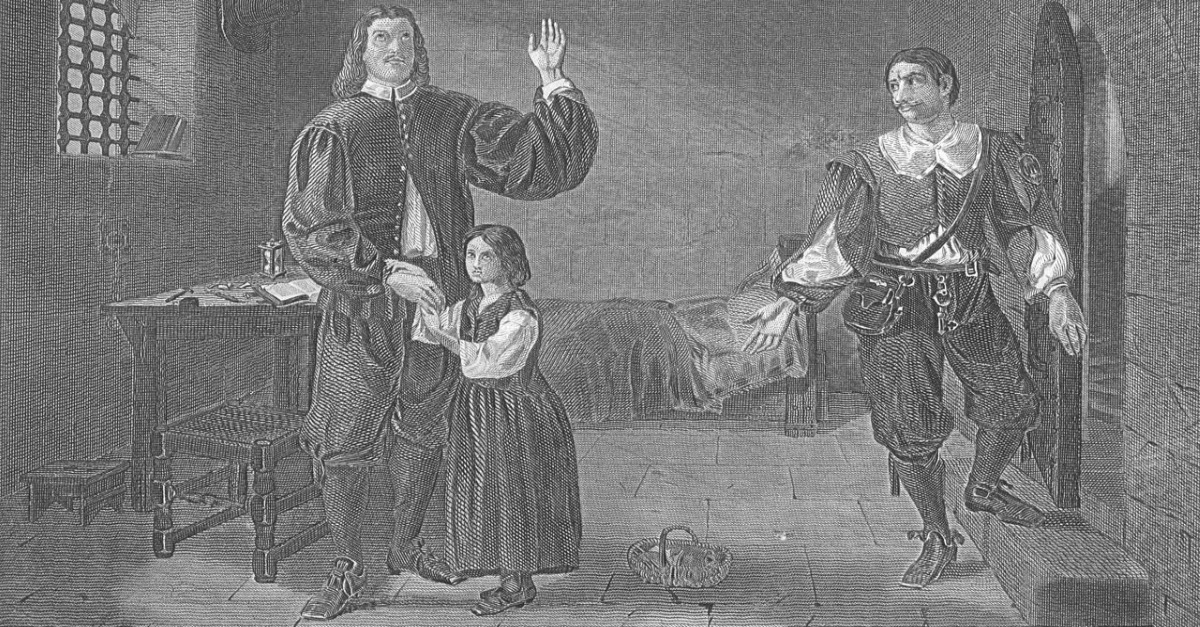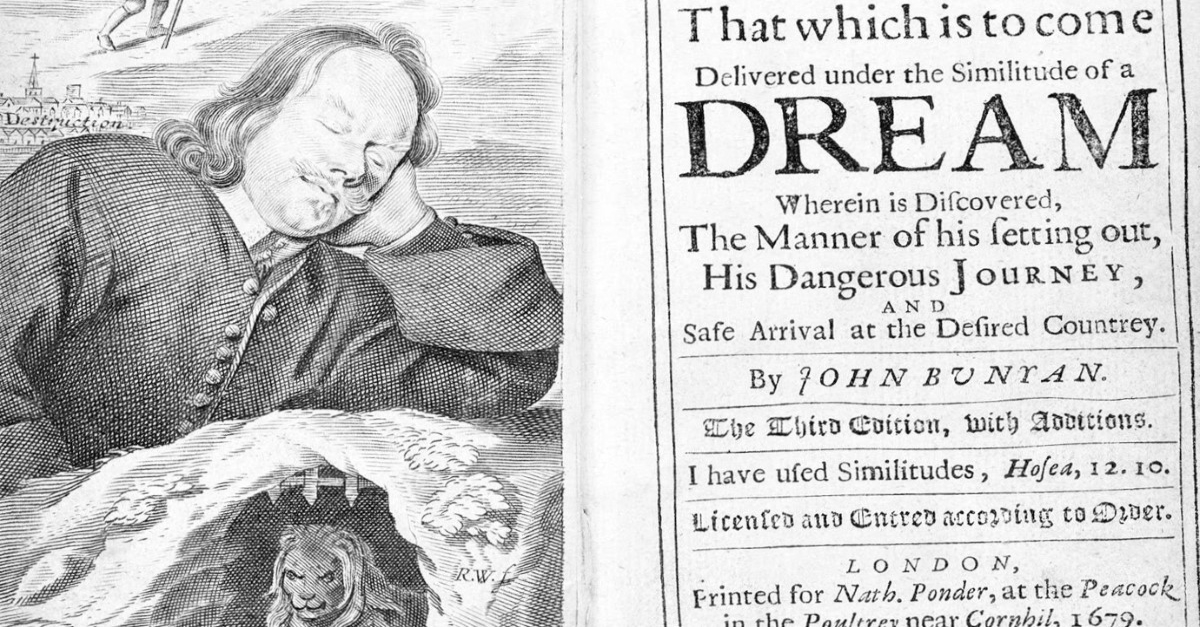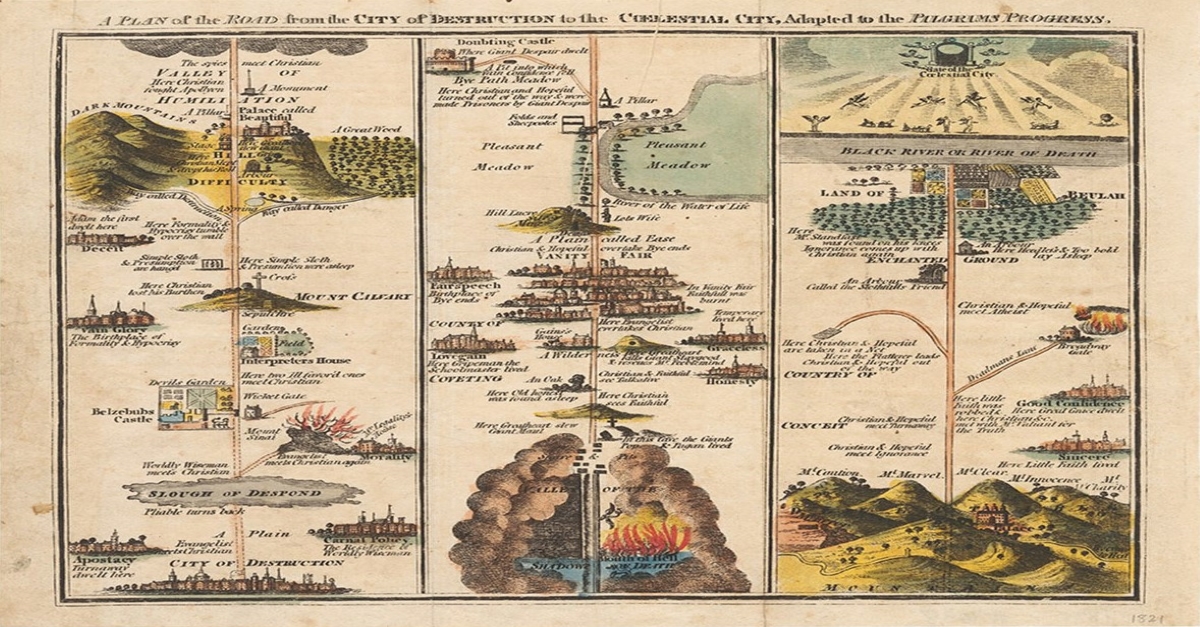If you compiled a list of important Christian authors, John Bunyan (1628-1688) would easily make it into the top 10. His novel The Pilgrim’s Progress is one of the best-known Christian books of all time, second only to the Bible. A fascinating allegory about the Christian life, it was a significant milestone in religious literature—and a surprising one, given that its author was a Puritan and the Puritans aren’t generally known for promoting imaginative literature. More surprising, John Bunyan was a tinker (a blue-collar metalworker) with no formal religious training, yet his writing and teaching won the attention of better-known teachers. When King Charles II asked theologian John Owen why he listened to Bunyan’s preaching, Owen reportedly said, “had I the tinker’s abilities for preaching, I would most gladly relinquish all my learning.”
Here is what you need to know about John Bunyan.

10 Important Events in the Life of John Bunyan
1. John Bunyan was born in November 1628 in the village of Elstow in Bedfordshire, England. His father was a tinker, and his family was poor.
2. Bunyan joined the Parliamentary Army in November 1644 after a proclamation called for recruits from his area. The conflict that Bunyan fought in (Charles I’s supporters versus Oliver Cromwell’s Parliamentarians) became known as the first phase of the English Civil Wars. Bunyan was stationed at Newport Pagnell until 1647, a garrison that didn’t see much fighting. However, historians have noted that Bunyan’s life at the garrison expanded his religious experience, exposing him to many religious groups (different Puritan sects, dissenting religious groups like the Quakers and Ranters) living there.
3. Bunyan married his first wife sometime between 1647 and 1649, after leaving the army and becoming a tinker. He did not record her name or their marriage date, although he mentioned two books she brought as her dowry: Arthur Dent’s Plain Man’s Pathway to Heaven and Lewis Bayly’s Practice of Piety. Bunyan said in Grace Abounding to the Chief of Sinners that these books “did not reach my heart, to awaken it about my sad and sinful state, yet they did beget within me some desires to religion.”
4. Bunyan began attending an independent congregation’s services in 1651 at St. John’s Church in Bedford. The congregation’s pastor, John Gifford, counseled Bunyan about his spiritual questions and Bunyan became an official member of the congregation in 1653.
5. Bunyan published his first work, a tract called Some Gospel Truths Opened, in 1656.
6. Bunyan’s first wife died in 1658, leaving him a widower with four children. He remarried in 1659 to a woman named Elizabeth, and they went on to have two children. By the time his first wife died, Bunyan was not only a deacon in the Bedford congregation but also a preacher.
7. In 1660, Charles II returned from exile and took the throne. Among other changes, the restoration of the monarchy cracked down on religious groups outside the Church of England, including unlicensed preachers. Bunyan was arrested that year for illegal preaching.
8. Bunyan was released from prison in 1972, thanks to Charles II’s Declaration of Indulgence giving leniency to “nonconformists.” He received a preaching license and became the pastor of the Bedford congregation. Along with pastoring the Bedford church, he preached at various other churches and published books about the Christian life.
9. Bunyan published his best-known work, The Pilgrim’s Progress, in 1678. Bunyan published the book a year after spending another six months in prison, but scholars generally agree that he started writing it during his first imprisonment.
10. Bunyan died of fever in 1688 in the home of his friend John Strudwick in Snow Hill, London. His second wife outlived him and later helped create a 1692 collection of his works. Between the works Bunyan published while he was alive and various posthumously published sermons and other pieces, his output included over 60 written works.

10 Classic John Bunyan Quotes
Given Bunyan’s prolific output, capturing all of his best ideas would fill an entire book. Here is a selection of his many thought-provoking words from his sermons as well as his fiction.
1. “Oh! The remembrance of my great sins, of my great temptations, and of my great fear of perishing forever! They bring afresh into my mind, the remembrance of my great help, my great supports from heaven, and the great grace that God extended to such a wretch as I.” — Grace Abounding to the Chief of Sinners
2 “‘What!’ said Obstinate, ‘and leave our friends and our comforts behind us?’
‘Yes,’ said Christian, for that was his name, ‘because that ALL which you shall forsake is not worthy to be compared with a little of that which I am seeking to enjoy…’” — Obstinate and Christian in The Pilgrim’s Progress
3 “Let the good Christian pray always; let him pray, and not faint at seeming delays; for if the widow by importunity prevailed with the unjust judge, how much more shall he with his heavenly Father. “I tell you,” says Christ, “that he will avenge them speedily.” — The Pharisee and the Publican
4 “How often have the Saints of God been made a most unexpected blessing to others. The good seed of Divine truth has been many times sown by those who did not go out to sow, but who were profitably engaged in cultivating their own graces, enjoying the communion of Saints, and advancing their own personal happiness!” — Memoir of John Bunyan (The Complete Works of John Bunyan)
5 “‘Thou, O town of Mansoul, hast hitherto been this fruitless tree; thou bearest naught but thorns and briars. Thy evil fruit bespeaks thee not to be a good tree; thy grapes are grapes of gall, thy clusters are bitter. Thou hast rebelled against thy King; and, lo! We, the power and force of Shaddai, are the axe that is laid to thy root. What sayest thou? Wilt thou turn? I say again, tell me, before the first blow is given, wilt thou turn?” — Captain Execution in The Holy War
6 “For while he was yet alive, even while he was yet in Jerusalem, and perceived even among these Jerusalem sinners, which was the most vile amongst them, he still in his preaching did signify that he had a desire that the worst of these worst should in the first place come unto him… He had a mind, a careful mind, as it seems, to privilege the worst of sinners with the first offer of mercy, and to take from among them a people to be the first fruits unto God and to the Lamb.” — The Jerusalem Sinner Saved
7 “Beloved, religion is the great bond of human society; and it were well if itself were kept within the bond of unity; and that it may so be, let us, according to the text, use our utmost endeavors “to keep the unity of the Spirit in the bond of peace.” — An Exhortation to Peace and Unity
8 “Slothfulness is usually accompanied with carelessness; and carelessness is for the most part begotten by senselessness; and senselessness doth again put fresh strength into slothfulness; and by this means the soul is left remediless. Slothfulness shutteth out Christ; slothfulness shameth the soul.” — The Heavenly Footman
9 “‘But,’ said Christian, ‘are there no turnings or windings by which a stranger may lose his way?’
GOOD-WILL: ‘Yes, there are many ways but down upon this, and they are crooked and wide. But thus thou mayest distinguish the right from the wrong, the right only being straight and narrow…” — Christian and Good-Will in The Pilgrim’s Progress
10 “Pharaoh was great, but God more great, more great in power, more great in wisdom, more great every way for the help of his people; wherein they dealt proudly, he was above them.” — The Saint’s Knowledge of Christ’s Love

10 Things You Probably Didn’t Know about John Bunyan
1. He experienced tragedy early on. The year Bunyan joined the Parliamentary Army was also the year that his mother and sister died—within a month of each other.
2. He wasn’t a “cradle Christian.” Bunyan’s description of his life in Grace Abounding to the Chief of Sinners shows a slow turn toward religion. He progressed from a childhood where “I had but few equals … for cursing, swearing, lying, and blaspheming the holy name of God,” to early married years where he became interested in religion, and then to his conversion.
3. He could have left prison earlier. During his first imprisonment, authorities offered Bunyan the chance for release if he agreed never to preach again. Bunyan turned these offers down and even preached to other prisoners.
4. He truly cared about his family. In an article for the Gospel Coalition, Jenny-Lyn De Klerk observes that recent scholarship has frowned upon Bunyan for not leaving prison to care for his family. However, De Klerk notes these scholars miss that Bunyan grieved being separated from his family and that he provided for them by making shoelaces and writing books.
5. He had a low opinion of his preaching. While Bunyan received many praises for his preaching, he downplayed its merits and highlighted God as the source of his success. In Grace Abounding to the Chief of Sinners, he describes feeling surprised “that God would speak through me to the heart of anyone” and frequently worrying about his preaching. Still, he routinely found that he felt “guilt and terror right up to the pulpit door, and there it has been taken off, and I have been at liberty until my work was done.”
6. He’s one of the most successful authors ever. It isn’t easy to find exact numbers of how many copies of The Pilgrim’s Progress have been sold, but it’s generally acknowledged as one of the best-selling books of all time. It reportedly sold 100,000 copies between 1678 and 1693 alone. Richard Clement, quoted in the Christian Post, observed that The Pilgrim’s Progress isn’t just one of the most printed books but also the English-language book with the most translations.
7. His writing is more complicated than it looks. The Encyclopedia Brittanica observes an interesting paradox at the heart of Bunyan’s work. He belonged to the Puritan movement, which generally disparaged fancy writing style as being unnecessary. However, Bunyan’s writing isn’t functional. He wrote characters and descriptions well, particularly for a tinker with no university education.
8. He wrote more than one allegory. While The Pilgrim’s Progress is Bunyan’s best-known work of fiction, he also wrote The Holy War, an allegory about the supernatural battle between God and Satan for humanity’s souls. Tim Challies and others have argued this book is well worth reading, even if it doesn’t compare to Bunyan’s masterpiece.
9. He (sort of) helped invent Christian fantasy. Typically, when someone mentions Christian fantasy today, we think of writers like C.S. Lewis and J.R.R. Tolkien or later authors like Robert Siegel and Walter Wangerin. However, Rolland Hein argues that Bunyan created a mythic world in The Pilgrim’s Progress comparable to what George MacDonald created in his fairy tales and the ones Lewis, Tolkien, Siegel, and Wangerin created in their stories. Colin N. Manlove takes a similar view, comparing the imaginative world Bunyan created to the one Edmund Spenser created in The Faerie Queen.
10. His work continues to change lives. Since Bunyan’s work has become so widely read, dismissing his writing as dated is tempting. However, multiple readers, lay people and scholars alike, have described how reading Bunyan has shaped them today. Erik Raymond writes about how Bunyan’s blue-collar background made his story relatable. Louis Markos describes how Bunyan’s image of the spiritual life as a journey—a journey we take outwardly and inwardly, where we don’t have to be the bravest traveler to reach our destination—helped him understand the nuances of the spiritual life.
Great Books by John Bunyan
The following are some of Bunyan's many great writings, all easy to find today.
Grace Abounding to the Chief of Sinners
The Life and Death of Mr. Badman
The Minor Works of John Bunyan
The Holy Life, the Beauty of Christianity
Further Reading:
10 Things You Need to Know about George MacDonald
9 Christian Authors You Should Know
10 Things You Need to Know about J.R.R. Tolkien
The Enduring Legacy of C. S. Lewis
Cover Photo Credit: Public Domain (via Wikimedia Commons)

This article is part of our People of Christianity catalog that features the stories, meaning, and significance of well-known people from the Bible and history. Here are some of the most popular articles for knowing important figures in Christianity:
How Did the Apostle Paul Die?
Who are the Nicolaitans in Revelation?
Who Was Deborah in the Bible?
Who Was Moses in the Bible?
King Solomon's Story in the Bible
Who Was Lot's Wife in the Bible?
Who Was Jezebel in the Bible?
Who Was the Prodigal Son?



